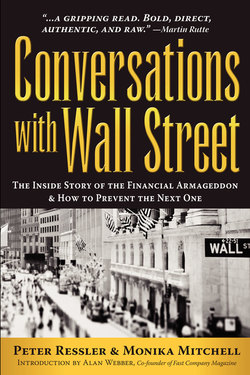Читать книгу Conversations With Wall Street - Peter Ressler - Страница 16
На сайте Литреса книга снята с продажи.
The Twenty-Eight Dollar Tomato
Оглавление“Gerry” was a mathematical genius. In his Docker slacks and tasseled loafers, he sported a “preppy” collegiate look with a Poindexter IQ. Built like a teenage boy, the 38-year-old calculus whiz looked 15 years younger than his age. Frail and thin, he spoke with a deliberate seriousness that belied his childlike frame. As he explained the mortgage models he had created, it became obvious he spent large portions of his days building algorithms. Yet for all his brilliance, he was humble and warm with a sharp engaging wit. A quant (PhD in complex mathematics) educated at Berkeley and MIT, Gerry explained how the industry forgot the fundamental rules of risk and reward. When the Street began to securitize NINJA loans (no income, no job, no assets), some analysts like Gerry voiced their objection. The research quant’s job was to analyze products and reveal market strengths and weaknesses. Gerry discovered early in the subprime era that many of the lesser quality securities were “too risky” and not worth their stated value. Upper management was virtually high on profit, refusing to acknowledge any flaws in the system. Every time Gerry expressed his concerns about questionable securities, he was told to, “Sit the fuck down and shut up, you negative dude.” Top managers believed he was looking at the glass as half empty, not half full. When the market tanked, the firm was left with tens of billions of dollars of defaulting assets on their books. Management called Gerry and his group in to analyze their assets to see if they had any remaining value. Gerry remarked that the head of fixed income “looked like a puppy who had just pooped in the corner and asked, Can you help us?” Gerry said to me, “It is a sad day when you find out your company behaves like that. Every time you dupe someone, you lose future business.” I asked Gerry the Genius what went wrong with management and their business model. He believed it was “a failure in leadership.” Top management forgot about cost and value. Gerry compared the mortgage-backed securities market to selling tomatoes. The MIT trained quant explained: “I sell you a tomato for twenty-three dollars. You sell it to someone else for twenty-five dollars, who then sells it to someone else for twenty-eight dollars. Yet in reality that tomato is only worth twenty-three cents. That is what went on in the mortgage markets.” The financial industry was left with billions of rotting tomatoes on its books after the crisis. Like tomatoes, defaulting loans have a short shelf life and are doomed to spoil. A senior vice president responsible for the origination and structuring of mortgage-backed securities at Lehman said: “The market was so hot for so long everyone just got caught up. There were other times when spreads widened and we made it through. We thought we could make it through again. No one expected the markets to seize up overnight. Add to that lax underwriting and ratings, and you have a time bomb waiting to explode.”
The value of a product is in the service it provides. Marking up a product to increase profits does not increase its value beyond the moment. The industry forgot the original intent of subprime mortgages was to give otherwise qualified borrowers a “second chance at homeownership.” Once the service behind the product was obscured, all bets were off—literally. When the markets “innovated” mortgage products that required no investment or down payment or credit risk from borrowers, the question for the industry should have been the following: “What value do these unsupported loans, which we are wrapping into complex securities and hedging with derivative products, contribute to society beyond a small group on Wall Street?” Since that question was neither asked nor answered, the market time bomb was set to explode. I asked Jeff the Lehman trader if he thought the crisis would enlighten the Street. He replied emphatically: “No, the Street has a short memory. Regulation may have to keep the memories fresh. The human element is too far removed.”
